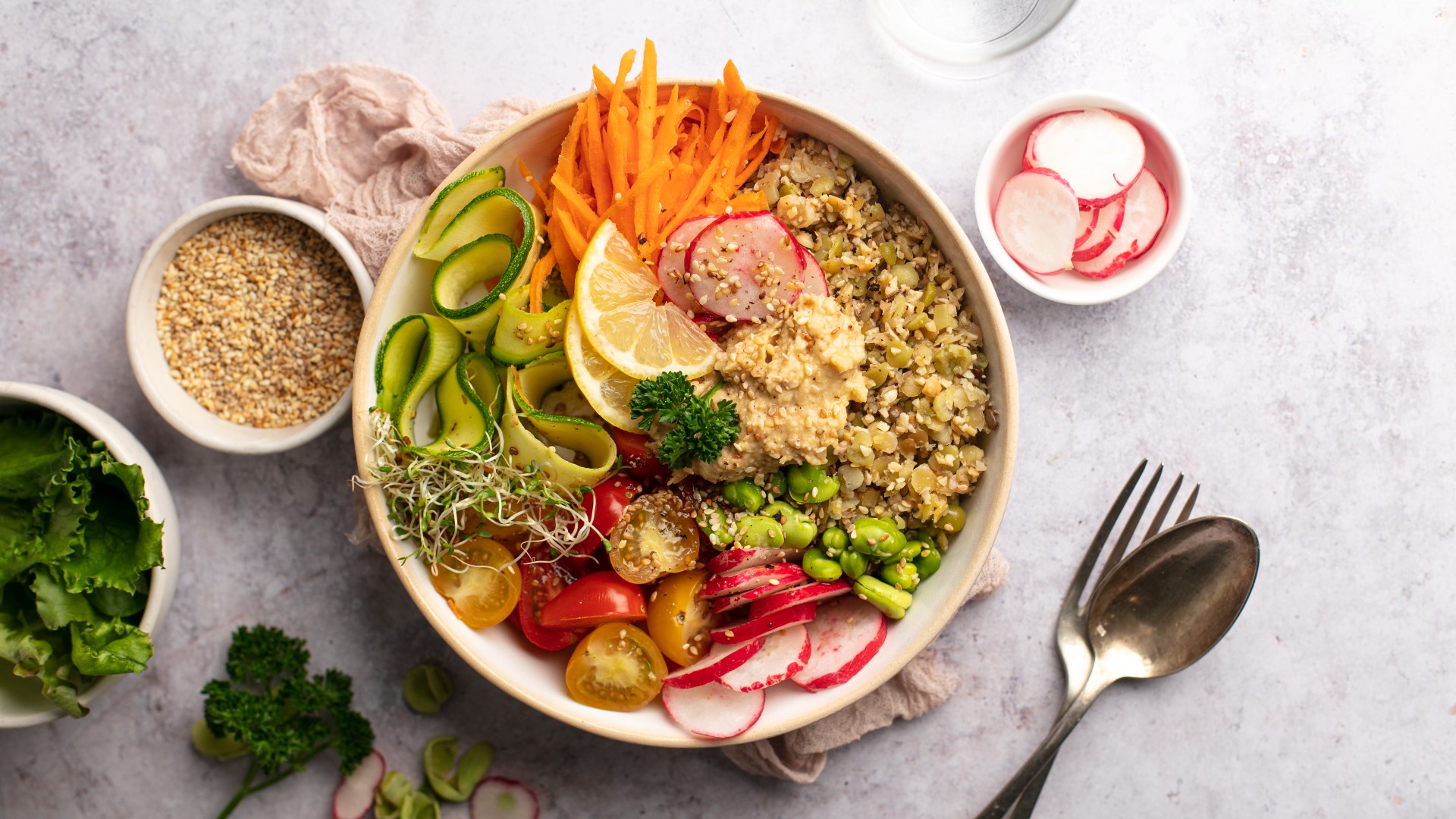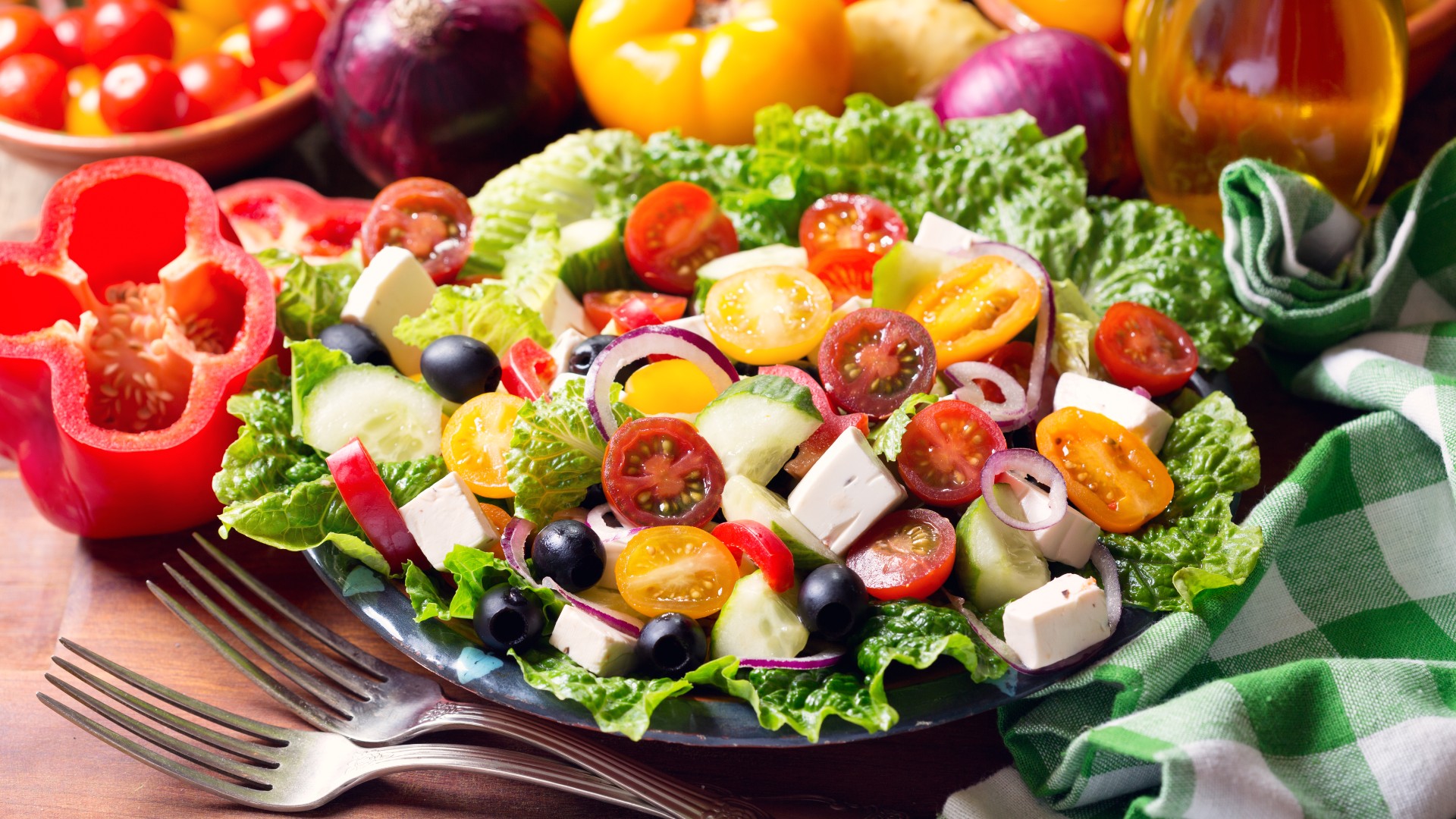Vegan vs Mediterranean diet: Which is better?
We’ve compared a vegan vs Mediterranean diet with help from some top nutrition experts, to see what effects they can have on our health

Get the world’s most fascinating discoveries delivered straight to your inbox.
You are now subscribed
Your newsletter sign-up was successful
Want to add more newsletters?

Delivered Daily
Daily Newsletter
Sign up for the latest discoveries, groundbreaking research and fascinating breakthroughs that impact you and the wider world direct to your inbox.

Once a week
Life's Little Mysteries
Feed your curiosity with an exclusive mystery every week, solved with science and delivered direct to your inbox before it's seen anywhere else.

Once a week
How It Works
Sign up to our free science & technology newsletter for your weekly fix of fascinating articles, quick quizzes, amazing images, and more

Delivered daily
Space.com Newsletter
Breaking space news, the latest updates on rocket launches, skywatching events and more!

Once a month
Watch This Space
Sign up to our monthly entertainment newsletter to keep up with all our coverage of the latest sci-fi and space movies, tv shows, games and books.

Once a week
Night Sky This Week
Discover this week's must-see night sky events, moon phases, and stunning astrophotos. Sign up for our skywatching newsletter and explore the universe with us!
Join the club
Get full access to premium articles, exclusive features and a growing list of member rewards.
The vegan diet and the Mediterranean diet have quite a few similarities. Both have potential benefits for health, as well as a lot of scientific research backing them up as nutritious options for most people. But there are also some key differences, and if you have certain health conditions or dietary requirements, you may want to talk to your healthcare provider before undertaking either of these diets.
The Mediterranean diet and the vegan diet are both based on primarily plant-based foods, and you can actually combine the two diets with a vegan mediterranean diet, which follows the core principles of both. The Mediterranean diet, however, does leave more room for the consumption of animal products, with an emphasis on oily fish, lean meats and eggs over red meat. The vegan diet is completely plant-based, with many vegans relying on supplements to get certain nutrients that they may miss out on due to not eating any animal products.
“Both diets are fairly different, and I wouldn’t say one is better than the other one,” says Roxana Ehsani, registered dietitian nutritionist and national media spokesperson for the Academy of Nutrition and Dietetics. “If followed correctly, both can be nutritious diets.”

Roxana Ehsani is a board-certified specialist in sports dietetics and a National Media Spokesperson for the Academy of Nutrition and Dietetics. She holds a Bachelor of Science in Human Nutrition, Foods and Exercise from Virginia Tech and a Master of Science in Clinical Nutrition and Dietetics from the University of Pittsburgh.
What is a vegan diet?
The vegan diet can be great for promoting heart health, weight loss and is generally thought to be a more sustainable way of eating than the average western diet.
“The vegan diet is becoming more popular, it’s a diet which eliminates all animal products and dairy products like cheese or yogurt or eggs, and strictly consuming plant-based foods,” says Ehsani. “You are able to eat vegetables, fruits, nuts, seeds, soy foods like tofu, plant-based milk options like almond milk, grains, seeds, legumes like beans and lentils.”
We also spoke to Dr. Lee, a medical doctor and representative for Dr Fox Online Pharmacy, who recommends reading the label to see what is vegan and what isn’t. “Vegans can eat dark chocolate. They can eat some biscuits — read the labels — they need to avoid those that contain animal fats. They can eat crisps if they have been made without animal flavorings. It’s a case of reading the label and knowing what you are eating,” she says.

What is a Mediterranean diet?
The Mediterranean diet is another great option for cardiovascular health, according to Ehsani. “The Mediterranean diet is a heart healthy diet, and has been extensively studied and rated by the U.S. News & World Report as typically the best diet overall when it comes to following a healthy eating plan,” she says. “The Mediterranean diet consists of fruits, vegetables, whole grains, monounsaturated fats such as olive oil, lean meats, seafood, legumes and nuts.”
Get the world’s most fascinating discoveries delivered straight to your inbox.
Vegan diet: Pros
According to Dr Lee, the vegan diet can be helpful in reducing instances of disease in those who follow it. “Overall, the vegan diet is felt to be beneficial for health as it contains large amounts of fruit and vegetables, whole grains, nuts, seeds and legumes,” she says. “Many health experts now recommend we increase our intake of plant foods and cut down on red meat. Vegans tend to have healthier lifestyles and a lower risk of medical conditions such as type two diabetes, colon cancer, cardiovascular disease, and non-alcoholic fatty liver disease.”
A Nutrients journal review tells us that a plant-based diet can reduce a patient’s risk of developing metabolic syndrome, which is a combination of diabetes, obesity, and high blood pressure. Reducing your consumption of red meat can also help reduce your risk of cardiovascular disease and increase longevity, according to research in the Journal of Internal Medicine, further supporting the benefits of a plant-based diet.
Ehsani agrees, the vegan diet carries many health benefits: “This diet is low in saturated fat, which is beneficial for heart health and lowers risk for developing chronic conditions like diabetes for example,” she says.
- Related: Do vegans live longer than meat eaters?
- Related: Is the vegan diet healthy?
Mediterranean diet: Pros
Ehsani tells us that the Mediterranean diet has been linked to positive cardiometabolic outcomes. “Many studies have shown that the Mediterranean diet is associated with decreased risk factors of heart disease,” she says. “It is also linked to lowered risk of developing certain cancers, decreased risk for developing depression and diabetes and can even be followed by a person with diabetes as it can help one keep their blood in check.”
One of the ways the Mediterranean diet can do this is through the promotion of sustainable weight loss. A study in Nutrients journal indicates that the Mediterranean diet can contribute to effective weight loss due to the emphasis on eating lean protein and high fiber foods. These foods are filling, which can help maintain a healthy weight as they give us a sense of satiety. This sense of satiety can also help maintain an overall calorie deficit, as a study in the Annual Review of Nutrition journal indicated that in adults aged 55-75, the diet was particularly effective in reducing abdominal fat.
A review in the American Journal of Medicine also indicates that the Mediterranean diet is lower in saturated fat than the average American diet, and suggests that it can reduce the risk of developing cardiovascular diseases. High consumption of vegetables, fruits, nuts and legumes can positively impact cardiometabolic risk, as seen in an Annual Review of Nutrition article, further supporting the Mediterranean diet as a healthy option.
Dr Lee explains that the high amounts of antioxidants in the Mediterranean diet can be beneficial for health. “It contains large amounts of fresh fruit and vegetables. These contain antioxidants which neutralize negatively charged particles known as reactive oxygen species (ROS). These ROS are being continually produced in the body during the process of oxidation. They are potentially dangerous as they can damage DNA, resulting in diseases such as cancer, atherosclerosis, type 2 diabetes or dementia,” she says.
“Fresh fruit and vegetables contain high concentrations of antioxidants — which are vital to keep human beings in good health. Those on the Mediterranean diet have been shown to have reduced levels of oxidative and inflammatory markers.”

Vegan diet: Cons
Vitamin B12 deficiency is something those on a vegetarian or vegan diet can be prone to, as B12 is a nutrient we generally get from animal sources and can’t make ourselves. Supplementation may be necessary for those on a vegan diet. The average adult needs 2.4 micrograms of vitamin B12 per day.
Ehsani agrees that deficiency is a risk the vegan diet carries. “It can be difficult for some people following a vegan diet to get in all nutrients like protein and vitamin B12 for example, but not impossible,” she says. “They just may need a bit more time preparing and planning out meals especially if away from home, it sometimes can be more difficult to find many vegan friendly options on every restaurant or fast-food menu for example.”
Iron and calcium deficiencies are of particular concern with a vegan diet and you must be careful to ensure that you are getting enough of these essential micronutrients. The limited bioavailability of these minerals in plant-based sources means that most vegans have to supplement or consume fortified foods to lower their risk of developing deficiencies, as seen in a study in the American Journal of Clinical Nutrition.
Mediterranean diet: Cons
The main cons of the Mediterranean diet are that it can be inaccessible to those on a low income and time consuming when preparing all foods from scratch. For instance, extra virgin olive oil, which is a large component of the Mediterranean diet, carries a high price, particularly for the higher quality oils. Those with a family or other commitments may find they struggle to produce Mediterranean diet friendly foods for every meal, but effective meal planning can help.
Dr Lee adds there is the chance of unintentional weight gain on the Mediterranean diet, and it may be unsuitable for those avoiding alcohol. “Eating too much olive oil and nuts, although full of healthy fats, means it’s easy to consume too many calories,” she says. “On the Mediterranean diet, moderate amounts of red wine are recommended. However, for some, this is not beneficial as it can exacerbate liver disease.”
This article is for informational purposes only and is not meant to offer medical advice.

Lou Mudge is a health writer based in Bath, United Kingdom for Future PLC. She holds an undergraduate degree in creative writing from Bath Spa University, and her work has appeared in Live Science, Tom's Guide, Fit & Well, Coach, T3, and Tech Radar, among others. She regularly writes about health and fitness-related topics such as air quality, gut health, diet and nutrition and the impacts these things have on our lives.
She has worked for the University of Bath on a chemistry research project and produced a short book in collaboration with the department of education at Bath Spa University.
 Live Science Plus
Live Science Plus










